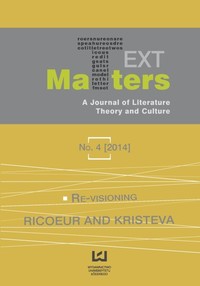Kristeva: The Individual, the Symbolic and Feminist Readings of the Biblical Text
DOI:
https://doi.org/10.2478/texmat-2014-0009Abstract
The aim of this study is to develop from Kristeva’s account of time and semiotics the conditions of possibility for a new approach to interpreting the Bible. This will be set against the background of feminist biblical criticism, beginning from Esther Fuchs’s assessment of deception. She bases her comparison on the concept of deceptiveness but I will argue, using Lacan, that the aporia of desire undermines this comparison. Through Kristeva’s framework of the phases of feminism it will be shown that Fuchs’s argument weakness lies in her presupposition of the determinate identities of men and women. By examining passages in Genesis it will be shown that such determined identities are also not easily found in the Hebrew Bible. Then by considering another feminist scholar, Alice Bach, it will be shown that overcoming identity requires a more nuanced approach. In the first version of “Women’s Time” Kristeva suggests that identities could be overcome through moving towards the individual but this also operates in the same structure of identity. In fact Kristeva appears to recognize this problem as when she republishes the essay she considers a different way forward. It will be instead suggested that a type of feminism that recognizes its own weakness is needed. This will be used to interpret Proverbs 31 but in doing so it will become evident that this alone lacks the potency to overcome the diffuse nature of the symbolic.
Downloads
References
Bach, Alice. Women, Seduction, and Betrayal in Biblical Narrative. Cambridge: Cambridge UP, 1997. Print.
Google Scholar
Deutscher, Penelope. How to Read Derrida. London: Norton, 2006. Print.
Google Scholar
Ehrensperger, Kathy. That We May Be Mutually Encouraged: Feminism and the New Perspective in Pauline Studies. London: Clark, 2004. Print.
Google Scholar
Fuchs, Esther. “‘For I Have the Way of Women’: Deception, Gender, and Ideology in Biblical Narrative.” Semeia 42 (1988): 68-83. Print.
Google Scholar
Fuchs, Esther. “Who Is Hiding the Truth? Deceptive Women and Biblical Androcentricism.” Feminist Perspectives on Biblical Scholarship. Ed. Adela Yarbro Collins. Atlanta: Scholars, 1984. 137-44. Print.
Google Scholar
Kesel, Marc De. Eros and Ethics: Reading Jacques Lacan’s Seminar VII. New York: SUNY Press, 2009. Print.
Google Scholar
Kristeva, Julia. Intimate Revolt. New York: Columbia UP, 2002. Print.
Google Scholar
Kristeva, Julia. New Maladies of the Soul. New York: Columbia UP, 1995. Print.
Google Scholar
Kristeva, Julia. Revolution in Poetic Language. New York: Columbia UP, 1984. Print.
Google Scholar
Kristeva, Julia. “Women’s Time.” Trans. Alice Jardine and Harry Blake. Signs 7.1 (1981): 13-35. Print.
Google Scholar
Lacan, Jacques. The Four Fundamental Concepts of Psycho-analysis. Harmondsworth: Penguin, 1986. Print.
Google Scholar
Lefebvre, Henri. Rhythmanalysis: Space, Time, and Everyday Life. London: Continuum, 2004. Print.
Google Scholar
Vaux, Roland de. Ancient Israel: Its Life and Institutions. 2nd ed. London: Darton, 1965. Print
Google Scholar
Downloads
Published
How to Cite
Issue
Section
License

This work is licensed under a Creative Commons Attribution-NonCommercial-NoDerivatives 4.0 International License.













